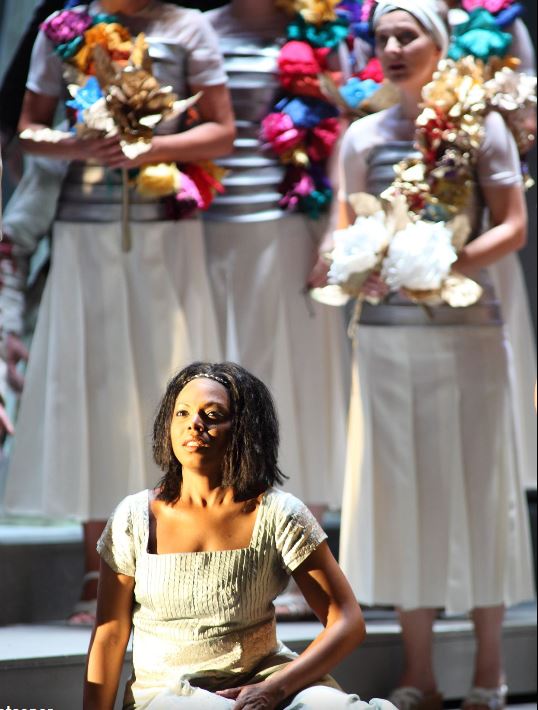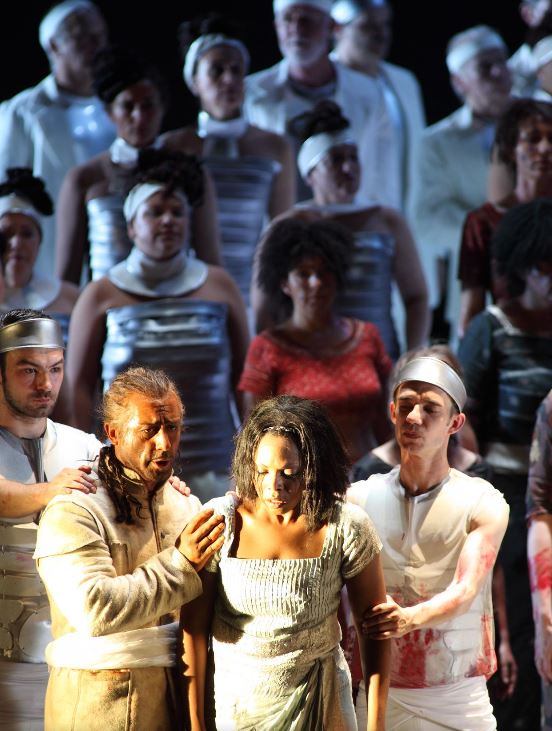By Tiziano T. Dossena —
Composer Giuseppe Verdi · Libretto by Antonio Ghislanzoni after Auguste Mariette Bey and Camille du Locle –
Friday, 25. September 2015 –
07:00 pm – 10:00 pm-
Nationaltheater-
Duration est. 3 hours · 1 Interval between 1. + 2. Acts and 3. + 4. Acts (est. 08:20 pm – 08:45 pm ) –
CAST:
Musical Director Dan Ettinger–
Production Director Christof Nel–
Policy Advice Martina Jochem–
Stage director Jens Kilian–
costumes Ilse Welter-Fuchs–
Choreographer Valentí Rocamora i Torà–
Lights Olaf Winter–
Choir director Sören Eckhoff–
Dramaturgy Olaf A. Schmitt–
- Amneris Anna Smirnova–
- Aida Krassimira Stoyanova–
- Radamès Jonas Kaufmann–
- Ramfis Christophoros Stamboglis–
- Amonasro Franco Vassallo–
- The King Marco Spotti–
- A messenger Dean Power–
- A priestess Anna Rajah–
SYNOPSIS
Act One
The rumour that the Ethiopian army has attacked the country causes Radamès, the captain of the Egyptian Guard, to dream of leading the army into war. If he were to be victorious, he would like to marry his secret mistress Aida, who is a prisoner of war living as a slave at the Egyptian court.
He has no idea of Aida’s true identity; she is in fact the daughter of the king of Ethiopia. Amneris, the daughter of the king of Egypt, is herself in love with Radamès and suspects that she has a rival in Aida. A messenger arrives and confirms the rumour; the Ethiopians have attacked the country under the leadership of their king, Amonasro.
 Radamès is proclaimed commander-in-chief of the Egyptian army. The king and the High Priest, Ramfis, lead the Egyptians in their rejoicing about the war. Amneris hopes that Radamès will return as victor. Aida joins in the general rejoicing but realizes the full meaning of her words when she remains alone. She imagines a scene in which Radamès has taken her father prisoner and begs the gods to let her die.
Radamès is proclaimed commander-in-chief of the Egyptian army. The king and the High Priest, Ramfis, lead the Egyptians in their rejoicing about the war. Amneris hopes that Radamès will return as victor. Aida joins in the general rejoicing but realizes the full meaning of her words when she remains alone. She imagines a scene in which Radamès has taken her father prisoner and begs the gods to let her die.
Praise is offered to the god Phta in a solemn ceremony. Ramfis asks him to bring them success in war and equips Radamès with consecrated weapons.
Act Two
Amneris has the slaves dance for her and dress her for the festivitiy with which the victorious army will be welcomed. She tricks Aida into admitting her secret love. Amneris taunts her slave with the fact that she is her rival and this makes Aida both proud and afraid at the same time. In order to demonstrate her superiority, Amneris orders Aida to accompany her to
the festivities.
The Egyptians and their priests assemble with the king to greet the triumphant army, and the prisoners of war are brought before the king, among them Amonasro. When Aida catches sight of him, he begs her not to reveal his position as leader. He pretends to be someone else and allows the Egyptians to think that the Ethiopian king has been killed in battle. He begs the king of Egpyt for mercy. Ramfis and the priests remind the king of the gods‘ wish that the prisoners should be killed. When the king grants Radamès a special request, he begs that the prisoners be set free. Finally the king follows the advice of the High Priest, and Aida and her father are to be kept as surety. He rewards Radamès for the victory by giving him his daughter’s hand in marriage. Amneris rejoices, Aida is without hope and in despair. Radamès privately thinks that he would prefer a life with Aida to the throne of Egpyt.
Act Three
On the eve of her wedding, Amneris is taken to the Temple of Isis by Ramfis. She is to prepare herself for marriage by praying there. Aida and Radamès have arranged to meet not far away from the temple. Amonasro, who knows of her secret love, appears and uses his knowledge to put Aida under pressure to discover from Radamès the Egyptians‘ plan for the the next battle. When she refuses he reminds her of her duty to her country and threatens to disown her as his daughter. He hides and listens, with Aida’s knowledge, to her conversation with Radamès. She has doubts about the success of his plan to ask the king for her hand after the next battle and suggests that they should flee together. She manages to get him to reveal, unintentionally, the secret war plan, the place where the next attack is to take place.
When Amonasro shows himself, Radamès learns the true identity of his beloved. He realizes in despair what he has done. Amneris, the priests and the guards come on the scene. Radamès makes it possible for Amonasro and Aida to flee and gives himself up to Ramfis.
Act Four
In spite of the fact that he is a traitor, Amneris still loves Radamès and wants to save his life at all costs. She wants to beg for mercy for him if he will only give up Aida. But Radamès spurns her, all he wants now is to die and he is led before the priests‘ court, accused of being a traitor. He remains silent in the face of the priests‘ accusations and is condemned to be locked up alive and left to die in a dungeon under the temple. Amneris curses the priests and maintains again and again that Radamès is innocent.

Radamès is awaiting death when he sees Aida, who has crept in to be with him. She wants to die in his arms. In their imagination they see the heavens opening to them. Aida collapses in his arms. Amneris begs for peace for Radamès.
© Bavarian State Opera











